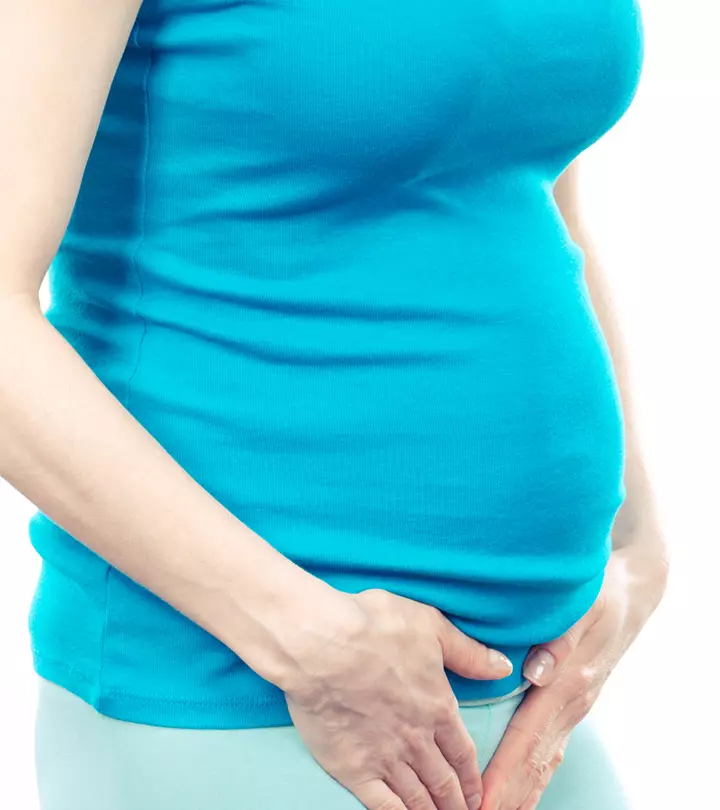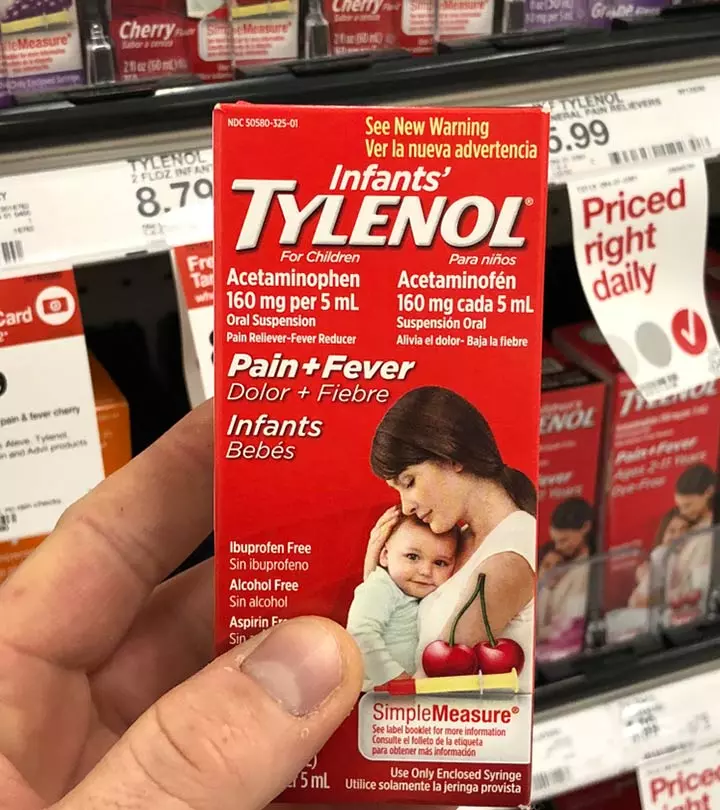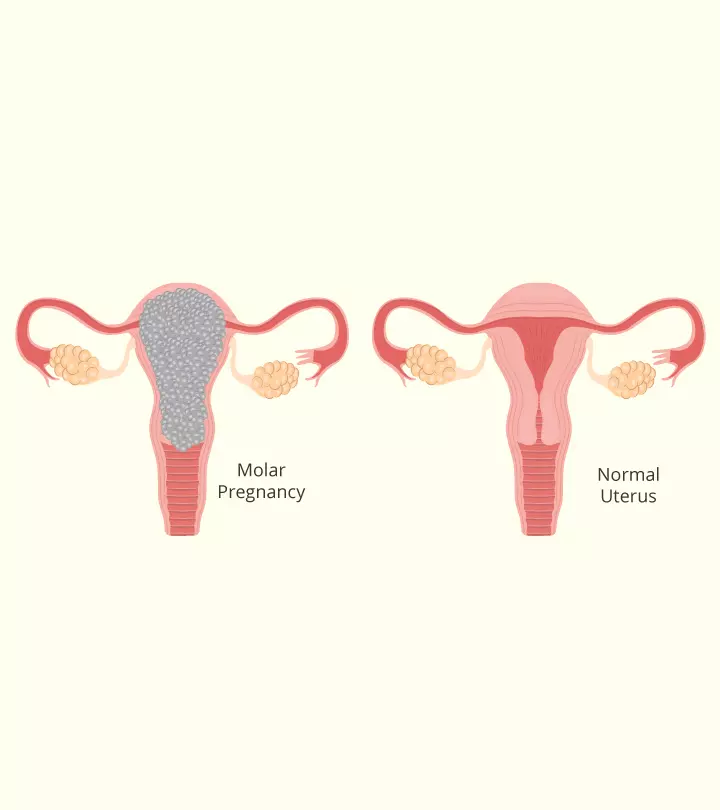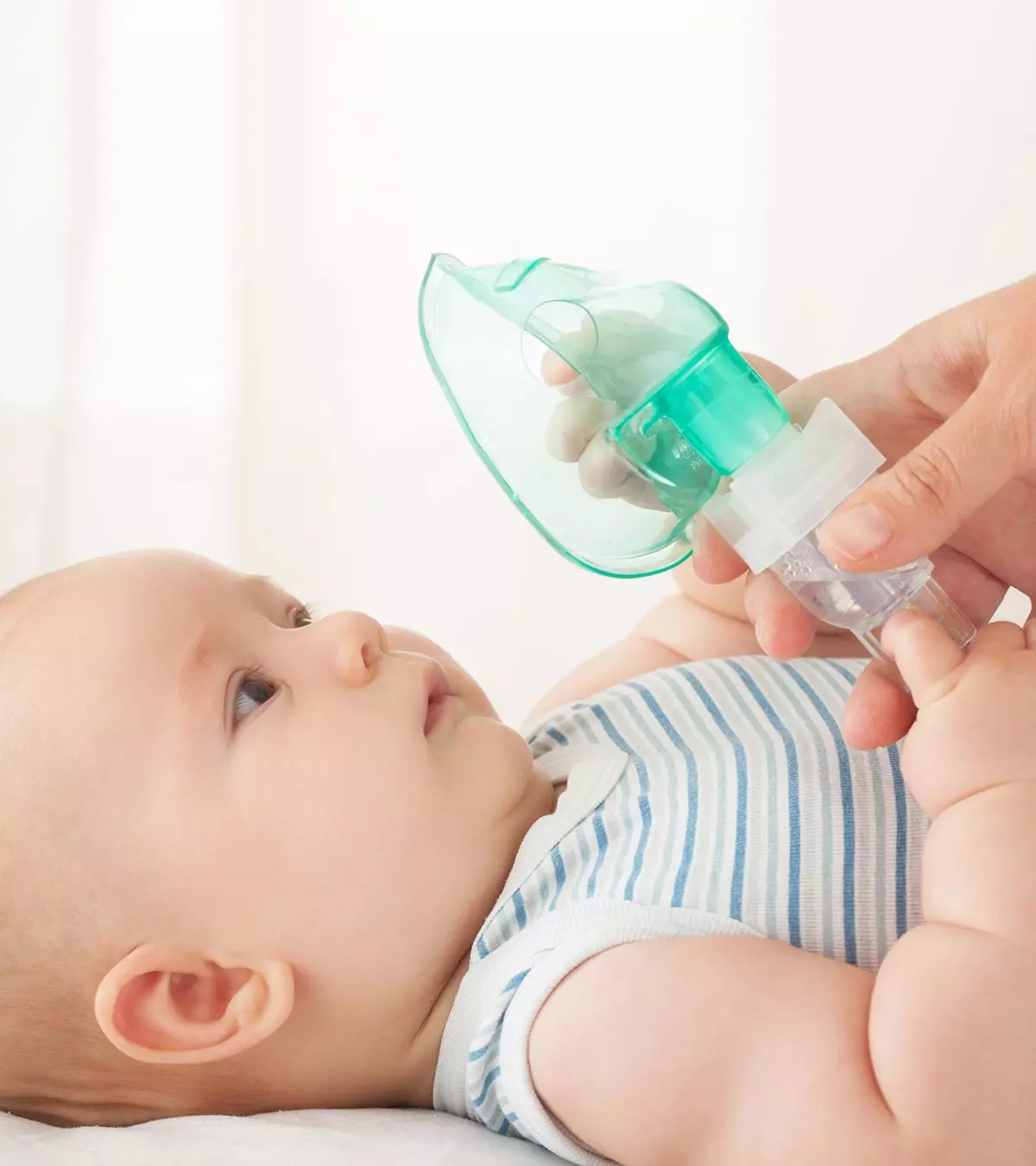
Image: Midjourney/ MomJunction Design Team
Smelly urine when pregnant is one of the several unusual symptoms one might experience. While it is not always a cause of concern, it may be uncomfortable for expecting mothers.

While some cases could indicate underlying pathology, it is essential to get examined by the doctor to rule out any infections or other problems causing smelly urine. Also, some care and precautions are essential in avoiding smelly urine during pregnancy. Read this post to learn the various causes and preventive measures of smelly urine during pregnancy.
Key Pointers
- Dehydration, certain supplements, and bacterial infections are some of the causes of smelly uring during pregnancy.
- Staying optimally hydrated, maintaining personal hygiene, and frequent emptying of the urinary bladder could help reduce the odor.
- Smelly urine isn’t usually a cause for concern unless accompanied by symptoms, such as lower abdominal pain, blood in urine, or fever with or without chills.
Causes Of Smelly Urine During Pregnancy
During pregnancy, your body undergoes significant hormonal and physical changes that can affect how your kidneys process waste and how frequently you need to urinate (1). Urine can smell different during pregnancy due to a heightened sense of smell, more urea in the urine, urinary tract infections, and even changes in diet. Most of these causes are usually benign and seldom to worry about.
Below is a list of the common causes of smelly urine in pregnant women.
- Heightened sense of smell: It is believed that pregnancy might increase sensitivity to odors, also known as hypersomia.iAn increased or heightened sense of smell Ammonia is naturally present in urine, but the smell is usually not strong. Due to the increased sense of smell in pregnancy, you can notice a bad odor. However, there is no medical evidence to establish a connection between increased olfactory response and pregnancy (2).
Dr. Brittany Noel Robles, a New York-based obstetrician-gynecologist, says, “An ammonia-like smell from urine may be caused due to different reasons such as dietary changes, vitamin ingestion, or dehydration. Dehydration can cause urine to become more concentrated and produce a stronger smell. However, a strong smell could also be a sign of a urinary tract infection, so it is important to speak with your healthcare provider if you have any concerns.”
- Urinary infections: Urinary tract infection is a bacterial inflammation or yeast infection in the urinary tract and is common in pregnancy (3). As per the reports of a study by multiple institutions, the rates of UTI during pregnancy were estimated to be between two and seven percent. Urinary tract infections can cause cloudy urine when pregnant, which smells foul or unusual (4).

- Bacterial infections: Bacterial vaginosis (BV) or vaginitis is a vaginal infection caused by the overgrowth of bacteria. It may lead to a burning sensation and foul smell while peeing (5). Other symptoms of BV include a thin, white, or gray discharge, itching or burning sensation around the outside of the vagina, a strong fishy odor, and pain or discomfort in the vagina (6).
- Diet: You may have weird food cravings in pregnancy. Certain foods, including cauliflower, broccoli, asparagus, garlic, coffee, and beer, can give the urine a temporary, strong odor (7) (8).
- Supplements: Certain medications, vitamins, minerals, etc., can cause an unpleasant urine odor. However, do not stop the medicines without consulting your doctor (7). Prenatal vitamins contain vitamins B and D, which can sometimes cause urine to have a strong odor (9).

- Dehydration: You should consume enough water for both your and the baby’s well-being. Otherwise, dehydration in pregnancy may lead to foul-smelling urine (9) (10).
- Other causes: Foul-smelling urine during pregnancy may also be caused by certain bladder infections, poorly controlled diabetes (which can cause sweet-smelling urine), liver disease, and certain metabolic disorders ( which can cause a musty smell) (11).
Tips To Help Reduce Urine Odor During Pregnancy

The following tips can help you prevent or manage foul urine smell during pregnancy.
- Drink six to eight glasses, or 1.5 to 2 liters of water or other fluids every day. Consuming sufficient fluids can prevent dehydration and foul-smelling urine (10).
- Maintain good hygiene to help prevent foul smells. For example, bathing regularly, wiping from front to back each time after peeing, using mild, non-fragrant soaps to clean the genitals, etc., can protect the vagina from infections and foul smells (12).
 Caution
Caution- Anecdotal evidence suggests that cranberry juice can help acidify the urine, reducing the foul smell from the urine (13). Apple cider vinegar is another suggested remedy.
- Empty the urinary bladder frequently to prevent urinary stasisiA condition where urine flows slowly or pools in the urinary tract instead of draining normally. , which can lead to an increased risk of UTIs, bladder infection, cystitisiA bladder infection that causes inflammation and irritation of the bladder, typically leading to painful, burning urination and a frequent, urgent need to pee. , and bad odor.

- Avoid multiple sex partners and intercourse without male latex condoms to help prevent UTIs or sexually transmitted infections (STIs) that may cause smelly urine.
- Probiotics are considered to be beneficial in promoting vaginal health for women. According to some clinical studies, consuming probiotics can help treat bacterial vaginitis and reduce its recurrence A scientific report states, “BV is a common disorder for the prevention of which, the vaginal flora needs to be normal and devoid of pathogens by the help of beneficial bacteria, suggesting women to consume probiotic foods will not only protect them against BV but will also reward them with other health benefits of probiotics (15).
Signs You Should Call The Doctor

Call your healthcare provider if you notice any of these signs along with the foul smell of urine (16):
- Blood in pee or vaginal discharge
- Lower abdominal pain
- Pain in the back or under the ribs
- A general feeling of not feeling well
- Unusual lethargy
- Confusion or agitation
- Fever with or without chills
- Low body temperature
- Changes in urine color
- Nausea or vomiting
Frequently Asked Questions
1. Why does my urine smell foul despite no infection?
Lack of adequate hydration can cause peculiar or foul urine smell without infections. Certain medications, vitamin B6 supplements, and foods can cause smelly urine. Liver and kidney problems might also result in smelly urine. If you notice any coexisting symptoms, it’s important to seek medical advice (16).
2. What is a natural remedy for smelly urine?
Drinking enough water is one of the best ways to eliminate smelly urine. Avoid holding pee for a longer time and acidic foods that can irritate the bladder. To promote urinary system health, you may consume unsweetened cranberry juices and probiotics (17).
3. What are the other symptoms of a urinary tract infection during pregnancy?
In addition to foul-smelling urine, urinary tract infections may exhibit symptoms like discomfort while urinating, incontinence, pain in the bladder, frequent urge to urinate, lower abdominal cramps, and change of urine color in pregnancy (4). Promptly contact your doctor if you experience these symptoms. Timely medical intervention will help effectively treat/manage the condition.
4. Can smelly urine indicate a severe health issue during pregnancy?
Smelly urine during pregnancy may indicate underlying signs of infections such as UTI or yeast infection. In rare cases, when the urine smells of ammonia, it could likely be indicative of liver or kidney diseases or sexually transmitted infections such as chlamydia (18). It is best to promptly consult a doctor before making any conclusions about the presence of such conditions.
Smelly urine when pregnant, though uncommon, is not necessarily abnormal. It can be due to the increased sense of smell, diet, or supplementation. So you need not worry much and keep your body water level up with proper hydration. However, consult your doctor immediately if the smell is accompanied by a burning sensation, pain, blood in urine, and other concerning symptoms. They may suggest an appropriate treatment plan and some effective home remedies in case of any underlying condition.
Infographic: Taking Care Of Your Bladder Health During Pregnancy
Among the several transformations your body encounters during pregnancy, changes in urinary routines are a prominent one. Considering the importance of following good urinary practices during pregnancy, we discuss the right habits that support a healthy bladder in the infographic below.
Some thing wrong with infographic shortcode. please verify shortcode syntax
Illustration: Smelly Urine During Pregnancy: Causes And Tips To Reduce It

Image: Dall·E/MomJunction Design Team
References
- Katharine L Cheung and Richard A Lafayette; (2013); Renal Physiology of Pregnancy.
https://pmc.ncbi.nlm.nih.gov/articles/PMC4089195/ - E. Leslie Cameron; (2014); Pregnancy and olfaction: a review.
https://www.ncbi.nlm.nih.gov/pmc/articles/PMC3915141/ - Urinary Tract Infection in Pregnancy.
https://www.ncbi.nlm.nih.gov/books/NBK537047/ - Urinary Tract Infection During Pregnancy.
https://americanpregnancy.org/healthy-pregnancy/pregnancy-complications/urinary-tract-infections-during-pregnancy/ - BACTERIAL VAGINOSIS AND PREGNANCY.
https://www.marchofdimes.org/find-support/topics/pregnancy/bacterial-vaginosis-and-pregnancy - About Bacterial Vaginosis (BV).
https://www.cdc.gov/bacterial-vaginosis/about/index.html - Smelly urine.
https://www.nidirect.gov.uk/conditions/smelly-urine - Is Smelly Urine Anything to Worry About?
https://www.poison.org/articles/is-smelly-urine-anything-to-worry-about - The Causes of Foul-Smelling Urine.
https://www.unitypoint.org/news-and-articles/the-causes-of-foul-smelling-urine-unitypoint-health - How much water should I drink in pregnancy?
https://www.tommys.org/pregnancy-information/im-pregnant/nutrition-in-pregnancy/how-much-water-should-i-drink-pregnancy - Urine odor.
https://medlineplus.gov/ency/article/007298.htm - Ying Chen et.al; (2017); Role of female intimate hygiene in vulvovaginal health: Global hygiene practices and product usage.
https://journals.sagepub.com/doi/full/10.1177/1745505717731011 - Ruth G Jepson et.al; (1998); Cranberries for treating urinary tract infections.
https://pmc.ncbi.nlm.nih.gov/articles/PMC7025796/ - Urinary Tract Infections.
https://my.clevelandclinic.org/health/diseases/9135-urinary-tract-infections - Parvin Bastani et al, (2012); Dairy Probiotic Foods and Bacterial Vaginosis: A Review on Mechanism of Action.
https://www.intechopen.com/chapters/39621 - Smelly urine.
https://www.nhs.uk/conditions/smelly-urine/ - The Best Home Remedies For UTIS.
https://nafc.org/bhealth-blog/home-remedies-for-utis - Smelly Pee? Here’s What It Means.
https://health.clevelandclinic.org/why-does-my-urine-smell - Douching.
https://womenshealth.gov/a-z-topics/douching - Is Starting Your Day With Lemon Water Healthy?
https://health.clevelandclinic.org/benefits-of-lemon-water
Community Experiences
Join the conversation and become a part of our nurturing community! Share your stories, experiences, and insights to connect with fellow parents.
Read full bio of Dr. Ng Kai Lyn
- Dr. Brittany Robles is a physician and the founder of Postpartum Trainer. She studied medicine at the Ross University School of Medicine and did her masters in Public Health in maternal health with a special interest in exercise and nutrition. Dr. Robles has four years of experience working as a physician at Wyckoff Heights Medical Center.
 Dr. Brittany Robles is a physician and the founder of Postpartum Trainer. She studied medicine at the Ross University School of Medicine and did her masters in Public Health in maternal health with a special interest in exercise and nutrition. Dr. Robles has four years of experience working as a physician at Wyckoff Heights Medical Center.
Dr. Brittany Robles is a physician and the founder of Postpartum Trainer. She studied medicine at the Ross University School of Medicine and did her masters in Public Health in maternal health with a special interest in exercise and nutrition. Dr. Robles has four years of experience working as a physician at Wyckoff Heights Medical Center.
Read full bio of Dr. Ritika Shah
Read full bio of Rebecca Malachi
Read full bio of Dr. Joyani Das

 Quick tip
Quick tip















